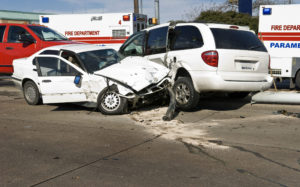What to do After a Multiple Vehicle Collision
A multiple-vehicle crash is a type of accident that involves more than one vehicle. If there are three or more vehicles involved, they are often referred to as a pileup crash. It is a chain reaction after the first collision, which creates an unavoidable obstacle for subsequent vehicles.

In most circumstances, you don’t want to move your vehicle after a collision so investigators can gather evidence to determine who is at fault. However, there are certain situations where drivers involved in the first collision must strive to move vehicles out of the road as quickly as possible to help avoid the possibility of a further pileup. If the crash happened during foggy weather or directly after a blind curve, for example, moving the vehicles if possible is the safest action for everyone on the road.
It is also advised that you stay in your vehicle with your seatbelt on if you cannot move your car or yourself to a safer place. Don’t risk getting out of your vehicle on busy roadways or when visibility is low. Instead, wait until police and EMS arrive and have secured the scene.
What are the Three Types of Multiple Vehicle Accidents?
Multiple-vehicle accidents happen most commonly in three ways:
- Highways — This is the most common place for pileups to occur. High speeds contribute to how many vehicles become involved in a highway pileup. It’s not uncommon for pileups to include dozens of cars.
- Intersections — One driver may run a red light or make an unsafe left-turn that causes a chain reaction of other vehicles colliding with one another.
- Rear-end — The initial impact of one vehicle rear-ending the vehicle in front of them may cause the vehicle that was hit to ram the car in front of it. Another common occurrence is for the vehicle that was rear-ended to be pushed into an intersection.
What are the Common Causes of Multiple Vehicle Accidents?
The most common factors that contribute to multiple-vehicle accidents include:
- Weather conditions and low-visibility
- Speeding
- Drowsy or distracted driving
- Driving under the influence
- Rubbernecking
- Tailgating
- Construction zones
The Most Dangerous Roads in Tampa
EverQuote compiled data from the NHTSA and found that Highway 4 in Tampa is the most dangerous in the United States. The community organization Plan Hillsborough’s Vision Zero program details Tampa’s most dangerous streets. The list includes:
- Mango Road/CR579 (MLK Boulevard to US 92)
- 78th Street (Causeway Boulevard to Palm River Road)
- Gibsonton Drive (I-75 to Balm Riverview Road)
- 15th Street (Fowler Avenue to Fletcher Avenue)
- Bruce B Downs Boulevard (BBD) (Fowler Avenue to Bearss Avenue)
- Sheldon Road (Hillsborough Avenue to Waters Avenue)
- Lynn Turner Road (Gunn Highway to Ehrlich Road)
- Fletcher Avenue (Armenia Avenue to Nebraska Avenue)
What are the Most Common Injuries from Multiple Vehicle Accidents?
As with many other types of crashes, many factors have influenced the types and severity of injuries suffered in a multiple-vehicle collision. The more vehicles involved, the higher the chances of severe injuries occurring from multiple impacts with your vehicle.
- Soft tissue injuries such as in the neck, spine, and joints
- Head injuries that may include Traumatic Brain Injury
- Burns from chemical spills, fire, or steam
- Broken bones
- Internal injuries
- Nerve damage from soft tissue or back injuries
What do I do After a Multiple Vehicle Accident?
The first step is to seek immediate medical attention, even if you believe you were not injured. The shock and trauma can desensitize you to potentially significant injuries. It may take hours, days, or even weeks for the symptoms of injuries to present themselves. Delaying medical attention could not only harm your well-being, but it can also cause hardships later on in the insurance claims process.
Our Tampa car accident lawyers advise that you contact us as soon as possible. Darrigo and Diaz Law has an expert team of vehicle rollover collision attorneys that can help reconstruct the event and get you the compensation you need to cover medical expenses. We encourage you to immediately reach out to us by calling (813) 774-3341 for a confidential, free, and no-obligation phone consultation.

